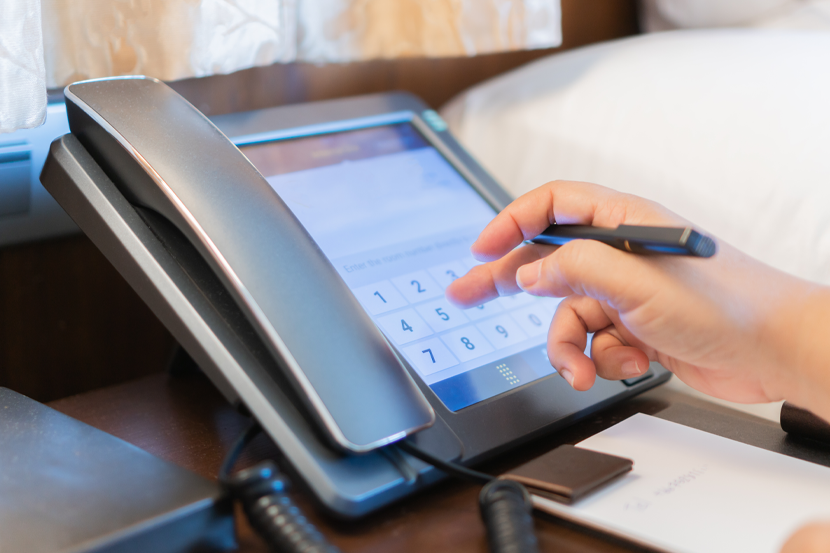Nowadays, businesses are looking for alternatives to replacing the traditional telephone system as part of their communication budget. Most enterprises use VOIP (Voice Over Internet Protocol) Communication Systems to help enterprises reduce their costs. It helps you with business communication specifically, so let us get straight to the point.
Hotel businesses looking to expand into new markets typically use virtual phone numbers. Because there is no hardwired connection, they offer greater flexibility than traditional phone numbers.
With virtual phone numbers, also known as direct inward dialing (DID) numbers, your business can reach distant customers and add a national presence, even if it has just begun spreading outside its local market.
Virtual Phone Numbers – what are they?
Customers can reach a business using a virtual number without relying on traditional landlines. A virtual number is a phone number that uses the internet instead of a conventional phone line or exchange to connect to a phone network.
As there is extraordinarily little physical hardware required, virtual phone numbers are used on any device that is connected to the cloud.
A VoIP provider can provide your business with as many virtual phone numbers as needed to reach locals in different markets. All your VoIP numbers can be managed through your VoIP software, and you can assign local area codes, 800 numbers, and international numbers to your business. Thanks to the software, you can easily accept calls according to your business requirements.
After a call center’s business hours on the East Coast have ended, do you still want calls after 5 p.m.? The virtual phone number software conveniently routes inbound calls instead of West Coast call centers.
Virtual Phone Number: How Does It Work?
A virtual number gets used to placing phone calls over the internet. You can make and receive calls without a SIM card, without cell tower coverage, and without a physical address. Local and national numbers are 10 digits, including the exchange, area code, and subscriber number.
Virtual phone numbers work with fast internet connections through cable, LTE, or Wi-Fi networks and laptops, phones, or desktop devices. Poor internet connections can cause poor call quality.
Using the internet eliminates the need for long-distance fees, expensive installations, and hardwiring requirements associated with copper wire networks.
Virtual phone numbers can be divided into four main categories.
- Vanity Numbers are numbers or phrases with catchy alphanumeric characters that make them easy to remember.
- Toll-Free Numbers – Customers can dial these numbers from anywhere in the country without having to pay long-distance charges.
- Local Numbers – Businesses can use local phone numbers to appear more local, even when they are located internationally.
- Local International Numbers – A company can appear local within a global market by acquiring local international numbers.
Is there a specific feature that a hotel phone system needs to have?
Hotel phone systems are telecommunications networks designed to allow seamless communication between hotel guests and their hosts.
Hotel staff can provide quick, personalized service to guests with the help of a customized caller ID.
Hotel phone systems facilitate the following hospitality communications:
- A single button can reach the front desk
- Communicating mode requesting housekeeping or room service
- Arranging wake-up calls
- Setting the Do Not Disturb feature
- Handling check-ins and checkouts
- Making reservations for meeting rooms
- Using the concierge’s direct line
VoIP for the hospitality industry lowers phone system costs.
You would need to install the phone lines and build the infrastructure to support a traditional PBX system. It would require additional phone company charges. As soon as you bundle the services, you will have separate and higher costs for phone and data.
VoIP systems reduce communication costs upfront and enable savings eventually.
You can integrate it with existing hardware and purchase softphones designed explicitly for VoIP use.
It implies that the new communication technology would enable data and voice to run on the same network. By adopting or expanding phone services, you can save time and money.
Using VoIP to improve hospitality front desk service
Hotels are always busy, so the front desk is always filled with calls. The phones rarely stayed on the hook, from reservations to vendor orders and guest inquiries. Using VoIP phone systems would ensure your guests are always accessible while improving your service without adding further burden to your staff.
A VoIP system that offers automated menus and responses can better handle incoming calls, such as an IVR or Interactive Voice Response system.
Creating interactive menus enables callers to request specific departments, make reservations, and answer FAQs (Frequently Asked Questions) using IVR. It is possible to complete all these tasks via phone without speaking to a staff member.
After-calls could also be routed to off-site answering services, ensuring that guests speak to a natural person as soon as necessary. Guests could always reach the right staff member, no matter what time they called or how many staff were on hand.
The expansion of hotel communication
Since the early 1990s, most telephone systems in hospitality have been limited to calling hotels or other phones within the hotel. The cost of this was high. A hotel communication system based on the internet allows them to expand their telephony options at an affordable price.
Broadband calling at these low rates allows guests to place long-distance calls and make calls over more than one line. With the VoIP system, guests will be able to use services like voicemail, video conferencing, speed dials, and virtual faxing from inside their rooms. It allows you to cater to a wide range of guests.
What Are the Benefits of Hotel PBX Systems?
As well as voice connectivity and calling, a private branch exchange (PBX) provides other features.
As a complementary component of their technology stack, hotel phone systems should offer advanced features and integrate with existing third-party tools.
What do the hotels seek from the cloud communication system (VOIP)?
You should carefully choose the right VoIP phone system for your hotel once you have decided to experience VoIP’s benefits in the hospitality industry. It would help if you considered the following factors:
- Familiarity with hospitality. A lack of knowledge about hotel communications might cause issues. For hospitality to run smoothly, many communication processes are involved, so the provider should be familiar with this. A more prepared provider will have a smoother installation and future use.
- Cost of the system. Hotel VoIP systems must offer your lifetime benefits and should be viewed as an investment. It is not wise to pick a cheaper option that does not satisfy your future needs. You would be better off spending more now and saving on upgrades later.
- Capacity for handling call volumes. Make sure the system can handle a large volume of calls. Make sure the system can handle both call volume and bandwidth requirements.
A VoIP feature for hotels. Before purchasing one, you should determine what you need. What are you offering to guests, and what is required of your staff? You should also be aware of compromises you are willing to make.
Traditional telephone numbers have limitations.
The physical connection of traditional PSTN lines means a business must do much more to establish relationships with virtual phone numbers. A call center must purchase multiple lines to keep their agents receiving phone calls because the PSTN supports only one number and one bar.
Due to their hardwired nature, these numbers cannot be shared across multiple call centers, thus preventing businesses from distributing their inbound services. A worldwide PSTN network has a considerable install base, but VoIP (Voice over Internet Protocol) eliminates the need for specific hardware for specific connections.
How do you pick suitable VoIP phones for the Hotel business?
Increasingly, VoIP is being used across various industries, and so is the equipment available to support it. Business phones are not the only hardware option available. VoIP solutions are designed to bring out the best qualities and features that make them stand out. Market share is being fought by several brands, including Cisco and Polycom. The value per performance has gradually shifted from companies like Yealink.
The hotels searching to minimize their communication bills and increase the guest flow should take all necessary steps to entice more towards the new digital age of mobile phones and quick services. It is an overview of some of the benefits of using a virtual phone system over a traditional landline.
Choosing a VoIP system provider who meets these criteria and your preferences will significantly benefit your hotel! So, why hesitate to consider the VOIP telephony service?









